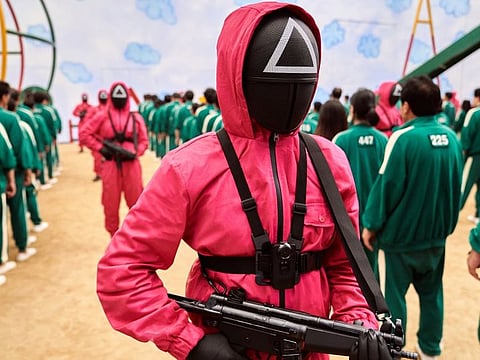Squid Game on Netflix: The highs, the lows and why we are still talking about it
They came, they saw ... and what a bloodbath. As season 2 drops, a look at its appeal

Dubai: Squid Game, Season 1 discourse dominated the last few months of 2021 and for good reason: It was a macabre and hellish horror show with essentially a simple premise: What if playing children’s games made you rich?
The thought of it is riveting for people strapped for cash in the show, and they sign up to compete in six games for a staggering cash prize. The small print: You’re killed if you lose a game.
.
The players learn the unwritten rules in the first round itself during a seemingly innocent game of ‘Red Light, Green Light. Their rivals drop like flies, around them as a robot doll shoots them. But the prize is too enticing to refuse, even if their better sense encourages them to leave their games, they return to this sinister place in the middle of nowhere.
The show gets uglier, coarser and a lot bloodier as the season progresses. Desperation and being pushed to the edge brings the worst out in people, and so they betray, fight, unleashing the animalistic side of themselves, while their captors in unfathomable masks watch. An unusual rag-tag team leads the show, Seong Gi-hun (Lee Jung-jae), a gambling addict with a heart of gold, and his dicey childhood friend Cho Sang-woo (Park Hae-soo), a disgraced banker and a fugitive. One of the best parts of the show is the cold Kang Sae-byeok (Jung Ho-yeon) – a North Korean escaper trying to save her separated family, who opens up to those around her. And the real heart of the show, is Anupam Tripathi’s character Ali, who honestly deserved so much better. But as the show grimly and subtly reminds, the good guys don’t always win.
It’s ugly, messy, and you can’t turn away from the show, despite a subplot on organ trading that adds nothing to the story. Well, at least till Episode 6. The storytelling for the first five episodes is tight, with surprisingly a lot of heart in all the bloodshed, as there are moments of warmth and sweetness between the friends. There is a subtler and piercing drama that unfolds in the dormitories; perhaps a lot more than what intriguing than the actual games itself. Moreover, the real terror is realising that people would rather participate, knowing the cost. The thought of returning to their old debt-ridden lives is far worse than a gruesome death. So, they would risk it all.
It’s this concept that hangs heavy in the show, as people wrestle with their own demons, along with others. Worse, it’s not even so much as the characters deaths; it’s how they are killed, too. From poker-faced robot dolls shooting them, to players trying to chisel a piece out of a honeycomb, which includes even licking it over and over, to make the job easier.
Episode 6 is where the story reaches its peak after enjoying a slow build: You’re kept on the edge as our team of desperate heroes square off in a heart-breaking game of marbles. The game is simple: Without being violent, find a way to gain all of your opponent's marbles. The winner proceeds. The loser is killed. It isn't until the contestants are instructed to divide into pairs that the real horror of human emotions explodes. It’s a you-or-your-friend situation. And how far can they go to win this game? As it turns out….very far. A shaking Gi-hun finds himself trying to trick a dementia-ridden player to give him the marbles. Ali pays the price for being warm and trusting, and the audience starts resenting the sight of Sang-woo. The episode was rife with tragedy, suspense and heartbreak.
And then after this episode, the show tries too much: There are far too many plots, including strange and peculiar foreigners watching the games unfold. The storytelling turns a tad trite and stretched, trying to accommodate a new host of irrelevant characters and plots, testing your patience along with the players resolve. The tension still engulfs the show, but perhaps it would have been far more gripping without resorting to overtly explosive drama, which dilutes what made the first part of the show so addictive in the first place/
Nevertheless, despite a rather disappointing second half, the show isn’t something you forget easily: It’s a jarring, uncomfortable and miserable portrait of people trying to eke out a painful existence. Reason and rationality is not to be reckoned with as only one thought echoes in a frazzled and exhausted consciousness: Money can buy you freedom and happiness. So, risk it all. And, the actors are all stellar as they delve deep into their complex, and deeply nuanced characters: They keep the show going, even when it falters.
So, will Squid Game 2 live up to the same hype and astronomical level of praise that the first season received? The show is returning along with our battered Gi-Hun; he means business this time. Who lives, and who dies? Well that remains to be seen, though one learning is for sure: Try not to get attached to any characters in Squid Game. That might not end well.
How can you watch it in the UAE: Squid Game 2 will stream on Netflix from December 26.
Sign up for the Daily Briefing
Get the latest news and updates straight to your inbox



